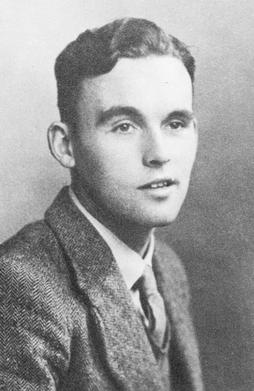All Day It Has Rained
Alun Lewis
All day it has rained, and we on the edge of the moors
Have sprawled in our bell-tents, moody and dull as boors,
Groundsheets and blankets spread on the muddy ground
And from the first grey wakening we have found
No refuge from the skirmishing fine rain
And the wind that made the canvas heave and flap
And the taut wet guy-ropes ravel out and snap.
All day the rain has glided, wave and mist and dream,
Drenching the gorse and heather, a gossamer stream
Too light to stir the acorns that suddenly
Snatched from their cups by the wild south-westerly
Pattered against the tent and our upturned dreaming faces.
And we stretched out, unbuttoning our braces,
Smoking a Woodbine, darning dirty socks,
Reading the Sunday papers – I saw a fox
And mentioned it in the note I scribbled home; –
And we talked of girls and dropping bombs on Rome,
And thought of the quiet dead and the loud celebrities
Exhorting us to slaughter, and the herded refugees;
As of ourselves or those whom we
For years have loved, and will again
Tomorrow maybe love; but now it is the rain
Possesses us entirely, the twilight and the rain.
And I can remember nothing dearer or more to my heart
Than the children I watched in the woods on Saturday
Shaking down burning chestnuts for the schoolyard’s merry play,
Or the shaggy patient dog who followed me
By Sheet and Steep and up the wooded scree
To the Shoulder o’ Mutton where Edward Thomas brooded long
On death and beauty – till a bullet stopped his song.
You may find this poem and others here.
This poem, written in 1940 by a soldier, captures the bleak monotony of life at war, particularly during long stretches of inactivity. The tone is reflective, melancholic, yet conversational. The poet emphasizes the camaraderie shared by the soldiers, marked by their casual banter about everyday life, women, and war, yet always under the looming shadow of death. The structure, composed of long, free-flowing lines, mirrors the slow passage of time, as they wait in the rain, blending memories of peace with thoughts of war.
Camaraderie is conveyed through simple, shared experiences: smoking, reading newspapers, and repairing socks. Yet amidst this, there’s an undercurrent of loss and weariness. The poem ends with a poignant juxtaposition, recalling Edward Thomas, a poet-soldier from World War I, and the children playing innocently in the woods. This connection between the soldiers’ present and a past world that held beauty and innocence highlights the human cost of conflict. The “twilight and the rain” symbolize how war has consumed the soldiers’ lives, overtaking the memories of peace and home.
The poem’s structure is free verse, lending it an unpolished, organic feel, reflective of the everyday moments during wartime. The use of imagery, particularly nature, underscores the contrast between the soldiers’ isolation and the life they left behind. The mention of Edward Thomas, a poet who died in World War I, deepens the sense of loss and the cycle of war’s relentless toll on those caught in its grasp.
At the conclusion of the poem, Alun references Edward Thomas a War time poet from World War I.
Edward Thomas (1878–1917) was a British poet and essayist renowned for his nature poetry and introspective writing. Initially known for his literary criticism and prose, Thomas only turned to poetry in 1914, influenced by his friendship with Robert Frost. His major works include Adlestrop, The Owl, and Rain, poems that often explore themes of nature, memory, and loss. In 1915, Thomas enlisted in the British Army and was killed in action at the Battle of Arras in 1917. His war poetry reflects a deep sense of melancholy and reflection on human fragility.
For more information, visit Edward Thomas’s Wikipedia page.
Alun Lewis

Alun Lewis (1915–1944) was a Welsh poet and short story writer known for his poignant works that reflect his experiences during World War II. After graduating from Aberystwyth and Manchester universities, Lewis began his career as a teacher before enlisting in the British Army in 1940. His military service deeply influenced his writing, as seen in his poetry collections like Raider’s Dawn (1942) and Ha! Ha! Among the Trumpets (1945). These works capture the disillusionment and human toll of war, blending themes of love, death, and nature with vivid, often melancholic imagery. Lewis tragically died in Burma in 1944, but his legacy endures as one of the foremost war poets of his generation.
For further reading, visit Alun Lewis’s Wikipedia page.



